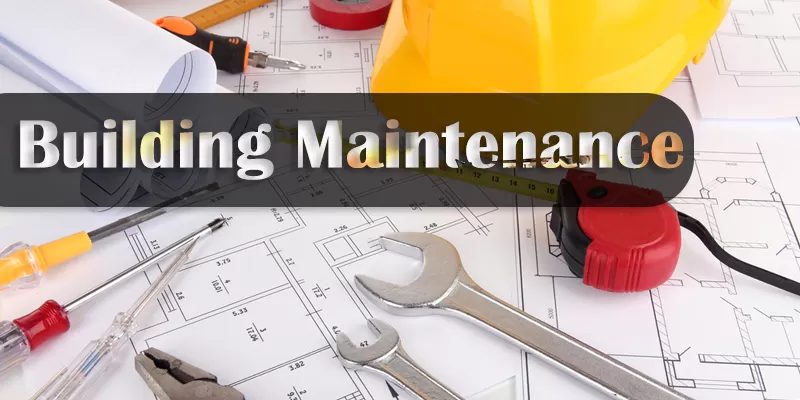
ITI Trade: Building Maintenance
Powered by NCVT (National Council for Vocational Training)
Overview
The ITI Trade in Building Maintenance is a job-oriented program designed to equip trainees with essential skills for maintaining and repairing various building structures. Powered by NCVT, this trade meets the demands of both government and private sectors. It offers excellent opportunities for self-employment and prepares students to fulfill the growing industrial needs of Indian and International infrastructure industries.
Course Objective
The Building Maintenance course trains individuals to effectively maintain and repair buildings, ensuring their structural integrity and aesthetic appeal. Trainees will develop proficiency in tasks such as bricklaying, plastering, painting, plumbing, and termite treatment, along with other general maintenance activities required for buildings and facilities.
Role of a Building Maintenance Technician
A Building Maintenance Technician performs a wide range of tasks, including:
- Laying bricks or stones using mortar and other construction materials to repair walls, arches, floors, pillars, and other structures.
- Dismantling masonry for reconstruction or for facilitating further work.
- Carrying out plastering, decorative pointing, and other finishing tasks.
- Erecting scaffolding to aid in construction and repair tasks.
- Painting interior and exterior walls to maintain the aesthetic appeal and protect surfaces.
- Replacing broken glasses, glazed tiles, and damaged fixtures.
- Conducting anti-termite treatments to prevent pest infestations.
- Repairing and maintaining sanitary fittings, plumbing systems, and drainage works.
Employment Opportunities
After successful completion of the ITI Building Maintenance course, candidates will have a broad scope of employability, including:
- Self-employment opportunities as independent contractors or building maintenance service providers.
- Contractual employment with construction and infrastructure development companies.
- Employment in the construction industry, real estate sector, facilities management companies, and government infrastructure maintenance departments.
Job Roles Available
Graduates can pursue roles such as:
- Building Maintenance Technician
- Mason (Building Constructor)
- General Building Repair Worker
- Facility Maintenance Supervisor
- Construction Site Maintenance Worker
- Plumber or Painter (based on specialization)
Career Advancement
The course also lays the foundation for further specialization and upskilling in areas like:
- Advanced construction technologies
- Civil engineering assistant roles
- Apprenticeship programs leading to National Apprenticeship Certificate (NAC)
- National Craft Instructor Certification (NCIC), enabling graduates to teach the trade to future technicians.
Block-I: Practical Tasks and Learning Outcomes
Building Maintenance Trade
- Follow Workplace Safety Standards
- Practice and perform all tasks following proper safety precautions and housekeeping standards on the shop floor.
- Masonry Work
- Construct brick walls of 10 cm, 20 cm, and 30 cm thickness using all types of bonds (English bond, Flemish bond, etc.).
- Build stone masonry structures, including Ashlar and Rubble masonry.
- Repair and Maintenance
- Repair and finish cracks in old brickwork and stone structures.
- Carry out pointing and plastering to strengthen and protect masonry work.
- Concrete Work
- Perform cement concrete and lime concrete works.
- Make RCC (Reinforced Cement Concrete) lintels and arches of various spans, including the setup of centering and shuttering.
- Flooring and Roofing
- Construct different types of floors and repair defective flooring.
- Repair cracks in various types of roofs to prevent leakage and ensure durability.
- Painting and Decorating
- Paint wood and steel structures with appropriate surface preparation and finishing.
- Perform whitewashing, apply distemper coats, and carry out color washing on building interiors and exteriors.
- Measure, plan, and construct false ceilings; lay wall coverings and wallpapers.
- Glazing and Damp Proofing
- Replace broken glass panes in windows, ventilators, and doors.
- Construct damp-proof courses to prevent moisture penetration in buildings.
- Finishing Work
- Perform varnishing and polishing on woodwork and furniture to enhance durability and appearance.
- Carry out tile work using vitrified and glazed tiles on walls and floors.
- Plumbing and Sanitary Work
- Perform pipe cutting, joining, and installation tasks.
- Carry out basic plumbing and sanitary works including fitting and repairing pipelines and fixtures.
Assessments and Certification
- Completion of Basic Training, Internal Assessment, and Final Examination is required to qualify for certification under NCVT standards.
